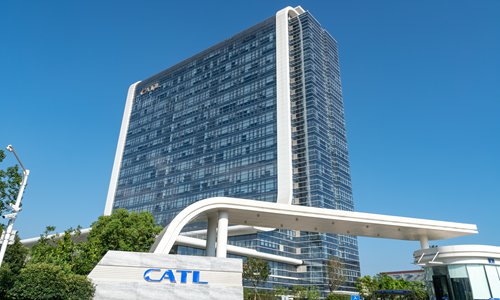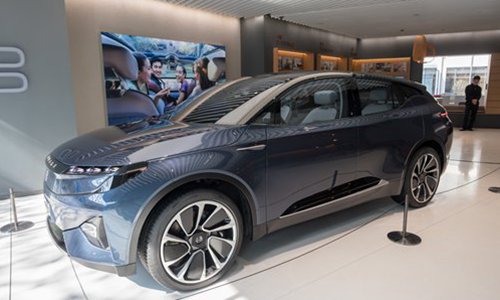China's fuel cell producer CATL hikes investment in German battery, R&D base
CATL hikes investment in German battery, R&D base

A view of CATL headquarters in Ningde, East China's Fujian Province Photo: VCG
China's leading fuel cell producer Contemporary Amperex Technology Co (CATL) will increase investment in its German electric vehicle (EV) cell battery base by up to 7.5 times, which an automobile expert said is "in line with commercial logic" as CATL wants to be close to its clients at a time when Germany is hugely expanding new-energy car production.
It also shows Germany's decision to cooperate with Chinese battery companies that have overwhelming advantages like low costs and high efficiency, the expert said.
CATL said in a stock a filing released on Wednesday that it will expand investment in its manufacturing and research and development (R&D) base in Europe. After the additional funding, overall investment in the project will reach as much as 1.8 billion euros ($2.04 billion).
In July 2018, CATL announced a plan to invest 240 million euros to build an EV battery manufacturing and R&D base in Germany.
"Behind CATL's move is a surge in Europe's EV industry, as many renowned German brands like BMW and Volkswagen are shifting their strategies from traditional internal-combustion cars to EVs," Feng Shiming, executive director of Menutor Consulting Shanghai, told the Global Times.
According to Feng, now that about 80 percent of the world's EV battery market is held by five Asian EV battery makers including CATL and LG, and it's inevitable that German carmakers will cooperate with these giants.
International EV battery producers like SK and LG have also set up battery manufacturing bases in Europe.
The German government is said to be concerned over this situation. It is reportedly providing large subsidies to domestic companies that are developing battery cell production bases at home. Germany is worried that its automobile industry may become overly dependent on Asian battery makers including those from China, South Korea and Japan.
"I think those efforts are too late," commented Feng. "Germany has already lost its competitive edge in EV battery manufacturing."
Germany's leading auto parts manufacturer Bosch announced its decision last year to give up manufacturing electric batteries.
"A division of labor, with China's advantage in EV batteries and Germany's advantage in car production, is the best choice for German firms," Feng said.
He added that Germany is highly dependent on the Chinese market, where there is huge demand for German cars, and the automobile industry is an important pillar of the German economy.
The German government has refused to bend under pressure from the US government to exclude Huawei's 5G technology, although the country has also urged Huawei to meet security standards, according to media reports.



